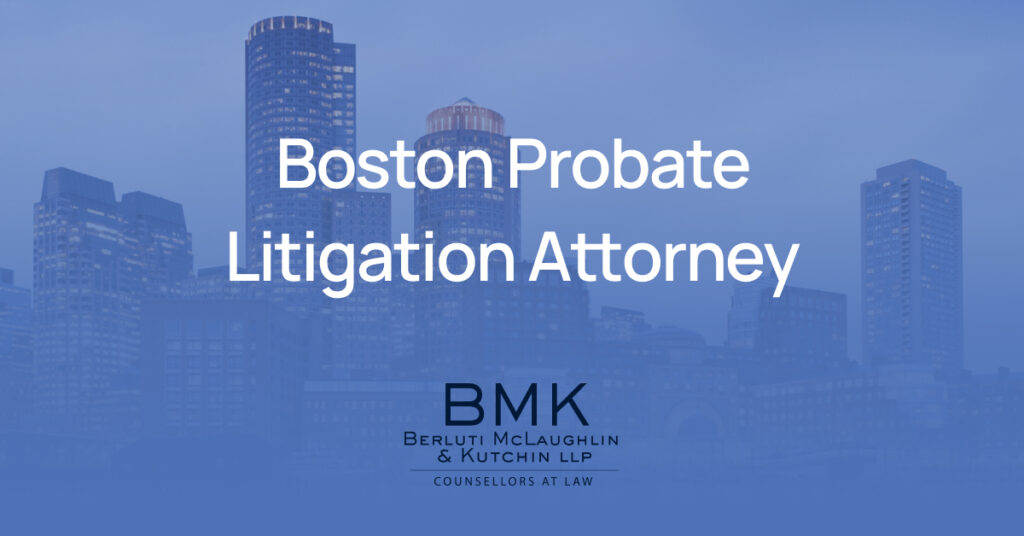
Probate litigation may arise when disputes develop during the administration of a decedent’s estate. These legal conflicts can delay inheritance, divide families, and deplete estate assets. A Boston probate litigation attorney can help you resolve these disputes efficiently through negotiation, mediation, or trial.
At Berluti McLaughlin & Kutchin LLP (BMK), we provide strategic, results-oriented probate litigation services. Our team combines decades of experience with a client-centered approach emphasizing practical solutions and responsive service. Whether you are contesting a will, defending your role as an executor or trustee, or navigating a complex family dispute, our probate litigation lawyers are here to help protect your interests and work to reach a fair outcome.
What Is Probate Litigation?
Probate litigation is the process of resolving legal disputes that arise during the probate of a person’s estate. The probate process requires oversight from a probate court, which may resolve related conflicts.
The Probate Process
Probate involves the following basic steps:
- Opening the estate by filing the deceased’s (decedent’s) will, if any, with a probate court or notifying the court about the individual’s death if no will was left;
- Appointing a personal representative who manages the estate and becomes its fiduciary;
- Inventorying the decedent’s assets;
- Notifying creditors and paying debts, including taxes;
- Distributing remaining assets to heirs or beneficiaries; and
- Closing the estate and filing a final accounting with the probate court.
The estate’s personal representative may be an executor, if the will designates someone to serve in the role, or an administrator if no executor is named. Conflicts can arise at any stage during probate.
When Probate Litigation May Arise
Probate litigation may be necessary when conflicts emerge among or between:
- Beneficiaries—those who inherit under a will or trust;
- Heirs—those who inherit under the law (not a will);
- Fiduciaries—those responsible for estate management, typically executors, administrators, or trustees; or
- Other interested parties—others with an actual or potential right to part of the decedent’s estate, such as creditors or heirs who may be entitled to assets if a court determines an offered will is invalid.
Probate disputes between these parties can take many forms. Some of the most common include:
- Will contests. Legal challenges claiming that a will is legally invalid. Common reasons a will may be invalid include that it is partially or entirely fraudulent, the decedent lacked mental capacity when they created the will, or it was not created properly under the law.
- Breach of fiduciary duty. Claims that a trustee or representative failed to act in the estate’s or beneficiaries’ best interest. Common breaches include mismanaging money, failing to share information, or not following the will’s instructions.
- Disputes between heirs or beneficiaries. Conflicts over who gets what, whether someone was wrongly left out, or how to interpret unclear language in a will.
- Trust disputes. Legal disputes involving how to interpret a trust’s terms or how trustees are managing the trust. Common disputes include disagreements about what the trust requires, what the trustee is doing or has done, and changes to the trust.
- Guardianship or conservatorship disputes. Conflicts over who should make personal or financial decisions for someone who cannot make their own choices. These disputes may involve deciding whether to place someone in a guardianship or conservatorship, or claims of mismanagement by a guardian or conservator in existing arrangements.
- Asset recovery. Efforts to get back property or money improperly transferred away, hidden, or given away under pressure before or after the person’s death.
Probate litigation often requires a close review of financial documents, the presentation of clear legal arguments, and courtroom advocacy.
Frequently Asked Questions (FAQs)
What Does a Probate Litigation Attorney Do?
Probate litigation lawyers help people involved in legal disputes during the probate process. Unlike probate administration lawyers, who assist with filings and estate management, probate litigators represent clients in contested matters. Our work includes:
- Investigate claims of wrongdoing,
- Challenge or defend the validity of estate planning documents,
- Protect fiduciaries or challenge fiduciary conduct,
- Represent clients in court,
- Negotiate resolutions outside of court,
- Help clients resolve disputes through mediation, and
- Ensure all parties meet their legal obligations.
In short, probate litigation lawyers help protect your rights and work to resolve disagreements during probate.
What Is the Difference Between Probate Administration and Probate Litigation?
Probate administration is the process of managing a person’s estate after death. Probate litigation happens when someone challenges the estate’s management. Unlike administration, probate litigation involves legal disputes that may require court involvement and formal hearings.
When Should I Hire a Probate Litigation Lawyer in Boston?
Consider hiring a Boston probate litigation lawyer if you:
- Believe a will is invalid or was created under suspicious circumstances,
- Are a fiduciary accused of wrongdoing,
- Are being excluded from an estate you believe you should inherit from,
- Suspect estate assets are being mismanaged, or
- Are involved in a family dispute over an estate.
Hiring an attorney early can help protect your rights, preserve critical evidence, and avoid escalating disputes.
Work with a Trusted Boston Probate Litigation Attorney
If you are facing a dispute over a will, trust, or estate in Massachusetts, the team at BMK is ready to help. Probate litigation often involves emotional family dynamics and significant financial risks. Our attorneys provide clear advice, responsive service, and trusted legal support to help protect your inheritance, your role as a fiduciary, or your loved one’s final wishes. If you live in the Boston area and are searching for a “probate litigation attorney near me,” contact Berluti McLaughlin & Kutchin LLP today.
